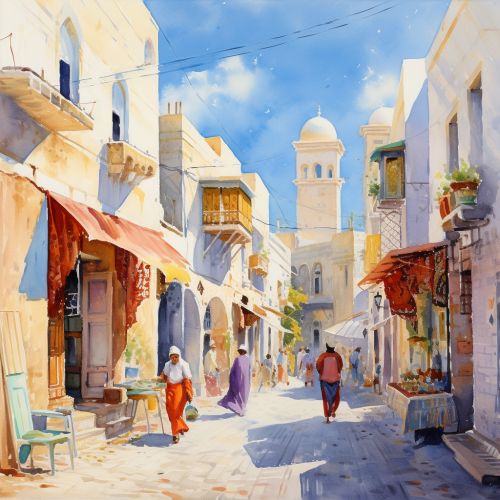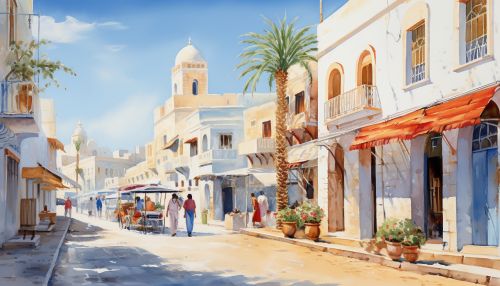Culture of Tunisia
Introduction
The Culture of Tunisia is a blend of native Berber and external influences, including Phoenician, Roman, Arab, Turkish, French, and others. Tunisia's cultural diversity is reflected in its music, cuisine, literature, and art. The country's cultural heritage is both rich and diverse, with a history that spans thousands of years and encompasses a variety of traditions and customs.
History
The history of Tunisia is marked by the influence of various civilizations that have occupied the land throughout the centuries. The Berbers, the indigenous people of North Africa, have had a significant impact on the culture of Tunisia. They have contributed to the country's language, music, and traditions. The Berbers were followed by the Phoenicians, who founded the city of Carthage, which became a major power in the Mediterranean. The Romans, Arabs, Ottoman Turks, and French have also left their mark on Tunisia's culture.
Language
The official language of Tunisia is Arabic, which is spoken by the majority of the population. However, a significant number of Tunisians speak Berber, particularly in the south and interior regions of the country. French is also widely spoken and used in business, education, and daily life due to Tunisia's history as a French protectorate. English is increasingly taught in schools and used in the tourism industry.
Religion
The predominant religion in Tunisia is Islam, with the vast majority of Tunisians being Sunni Muslims. The country is known for its moderate form of Islam, which is reflected in its constitution and social life. There are also small communities of Christians, Jews, and Baha'is in the country.
Cuisine
Tunisian cuisine is a blend of Mediterranean and desert dwellers' culinary traditions. Its distinctive spiciness comes from the many civilizations who have ruled the land now known as Tunisia. Common ingredients include olive oil, spices, tomatoes, seafood and meat, particularly lamb and beef. Couscous is the national dish, and other popular dishes include brik (a pastry), tajine (a slow-cooked stew), and lablabi (a spicy chickpea soup).
Music
Tunisian music is a mixture of Arabic, Berber, and French influences, among others. Traditional music styles include malouf, a genre derived from Andalusian music, and mezoued, a genre that originated among the rural and working classes. In recent years, Tunisian music has also incorporated elements of Western genres such as rock, hip hop, and techno.
Literature
Tunisian literature is written in Arabic, French, and Berber. It encompasses a range of genres, including poetry, novels, and plays. Tunisian literature often reflects the social and political realities of the country, with themes such as identity, resistance, and the role of women in society being common.
Art
Tunisian art has been influenced by the country's diverse history. Traditional art forms include pottery, weaving, and calligraphy. Modern Tunisian art is diverse, with artists using a range of styles and mediums to express their ideas and experiences.
Society
Tunisian society is characterized by its diversity and tolerance. While the country is predominantly Muslim, it is known for its progressive laws and attitudes towards women's rights and freedom of expression. Tunisia's education system is one of the best in Africa, and the country has a high literacy rate.
See Also


